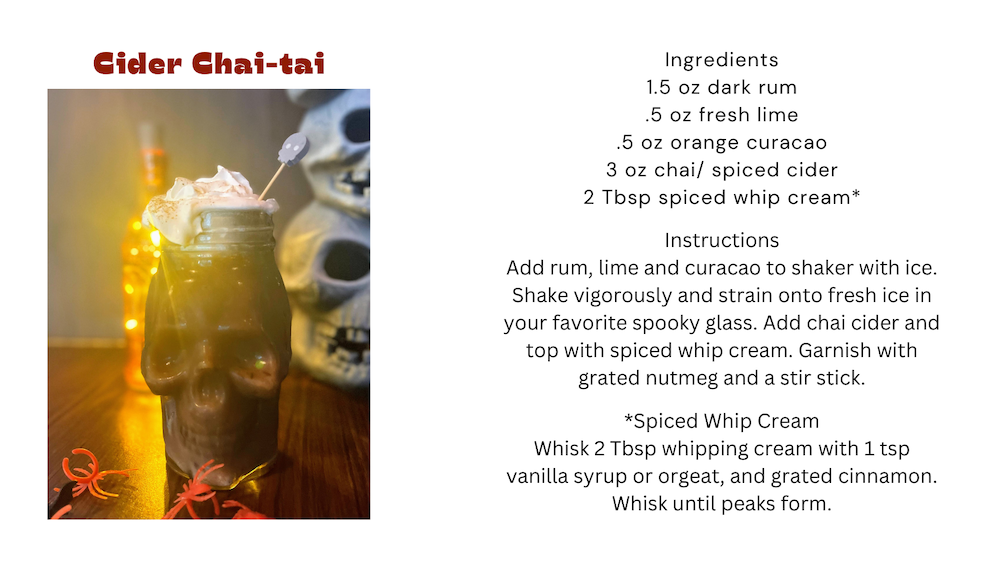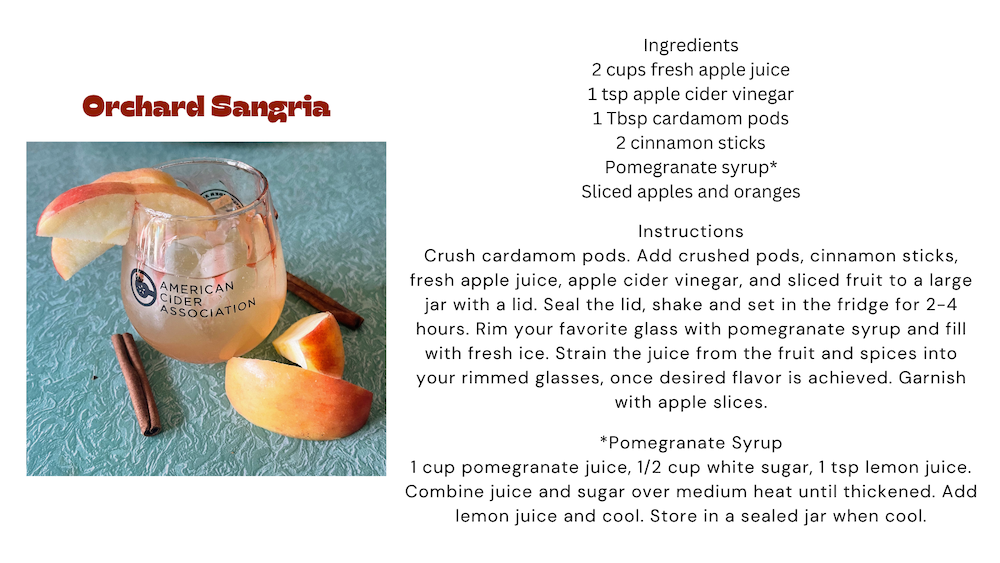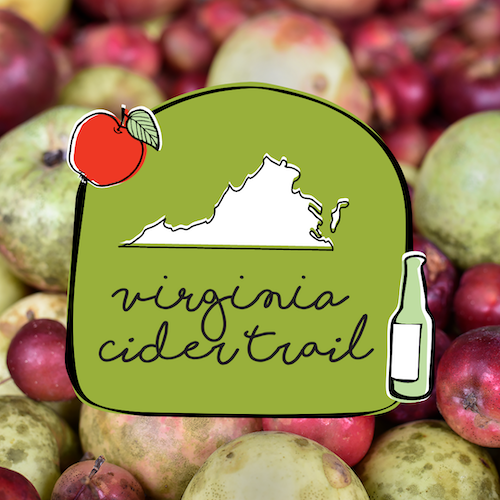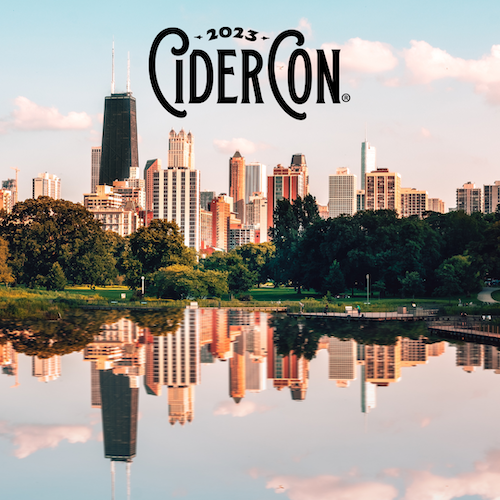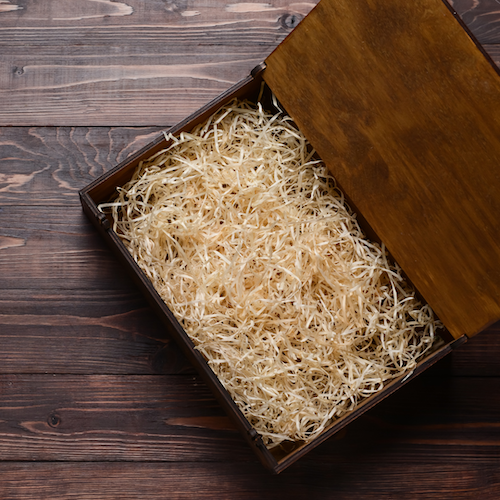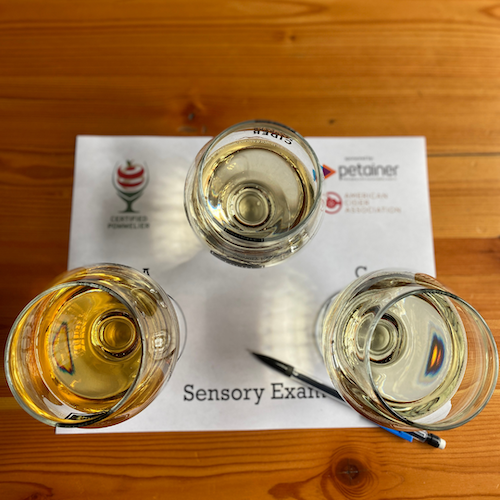Posts by Woodley Smith
Spooky Cider Cocktails
Live Sensory Analysis Webinar with Ploughman’s Cider
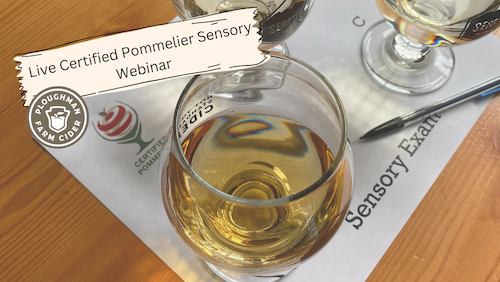
Looking to up your sensory analysis skills? Studying for the Certified Pommelier™ Exam at CiderCon® 2023? Join our Certified Pommelier™ panel in a live practice sensory webinar featuring cider from Ploughman’s Cider on November 17 from 4-6pm Pacific. Cost to attend the workshop is $15 for ACA members and $30 for non-members.
This webinar will also be available to rewatch and practice as a prerecorded event.
Ploughman’s has generously created a limited time Sensory Analysis Bundle for this webinar. You can purchase the cider bundle here.
Virginia Cider Trail Fall Events
Fall has officially arrived and apple harvest season is in full swing across Virginia! To celebrate, cidermakers across the state are hosting harvest festivals, pressing parties and cider release events. They would like to invite you to join in their celebrations of the cidermaking season with orchard parties and more. Check out the list below to find a fun event in your neck of the woods or one further afield if you’re looking for a fall weekend getaway!
- October 14: Harvest Release Party & Foodlore Friday at Troddenvale Cider
- October 15: 6th Anniversary Harvest Party at Blue Bee Cider
- October 15: Pomona Party at Cider From Mars
- October 15-16: Fall Festival at Coyote Hole Ciderworks
- October 15-16: Harvest Fest & Sunday Brunch at Courthouse Creek Cider
- October 15-16: Bryant’s Fall Festival at Bryant’s Cider & Brewery
- October 22: OkTOADerfest 2022 at Blue Toad Hard Cider
- October 22-23: Haunted Trail at Coyote Hole Ciderworks
- October 29: Halloween Street Party at Tumbling Creek Cider Company
- October 29: Halloween Dance Party at Stable Craft Brewing
- October 29-30: Haunted Trail at Coyote Hole Ciderworks
- November 5: 22nd Annual Apple Harvest Festival at Albemarle Ciderworks
- November 5: Apple Harvest Festival & Makers Market at Sage Bird Ciderworks
- November 11: Buskey Hewes Crab Cider Release Party at Buskey Cider
- November 11: Cider Smackdown at Albemarle Ciderworks
- November 12: Apple Butter Festival at Bryant’s Cider & Brewery
- November 12: Lake Anna Cider Festival at Coyote Hole Ciderworks
- November 12: VA Cider Week Kick-Off Party at Cider From Mars
- November 19: Cider & Sides Dinner with Henway Hard Cider
- November 19: Harvest Hoedown at Potter’s Craft Cider
We hope you’ll take the time to visit one or more of these fantastic fall events and learn more about Virginia apples and the ciders made from them. And don’t forget to check in on your Virginia Cider Trail Passport for a chance to earn prizes!
ACA Announces Registration is Now Open for CiderCon® 2023!
The American Cider Association is pleased to announce that CiderCon® 2023 will take place in Chicago, Illinois from January 31 – February 3, 2023. With tours, tastings, educational workshops, demos and more, CiderCon®’s Chicago homecoming is set to be an educational celebration of all things cider. Registration opened on September 29, 2022.
After a four year hiatus, the return of CiderCon® to Chicago has been much anticipated and the ACA has been working with folks on the ground in the Windy City to make the homecoming spectacular. This includes four exciting tour options: a look at Chicago’s history through the lens of taverns, a tour of the Bronzeville neighborhood in Chicago’s historical south side, a tour visiting three unique Chicago-based cideries, and a cider and architecture tour featuring the stunning works of world-famous architect Frank Lloyd Wright.
A full range of educational sessions will cover topics of cider production, marketing, sales, branding, sensory evaluation, compliance, business strategy, orcharding and more. Speakers include Claude Jolicoeur (author of Cider Planet), Yann Gilles (cider and wine consultant from France), Lester Jones (Chief Economist from NBWA), Julie Rhodes (Not Your Hobby Marketing), Mary Mills (3 Tier Beverage), Dr. J Nikol Jackson-Beckham (Brewer’s Association and Crafted for All), Elizabeth Ryan (Hudson Valley Farmhouse Cider), Bryan Roth (Good Beer Hunting), Liz Garibay (Chicago Brewseum), Elizabeth Garofalo (Red Tomato Food Hub) and many more, plus new presenters joining every day.
“We have so many amazing sessions already lined up and others in the works, “ said ACA Executive Director, Michelle McGrath. “We’re emphasizing cider quality, terroir and retail strategy this year. It’s been rewarding to think about the impact of CiderCon® on the industry, and to rise to the challenge of deepening that. CiderCon® is very special and we’re committed to improving it every year.”
The extensive trade show, presented by longstanding ACA partner FruitSmart, will feature many beloved vendors excited for the return of CiderCon® to Chicago and welcome several first time vendors eager to join the cider community and meet conference attendees.
Tickets to CiderCon® are just $425 for for ACA members if booked by October 22. After October 22, member registration rates become $475. Public tickets are $725 for early registration and $775 after October 22.
More information about the wide array of events and educational sessions being offered and registration can be found on the CiderCon® website and you can follow @cidercon on Twitter for the latest news. CiderCon® is an ACA event produced with the generous support of our members and ACA’s premier sponsor, FruitSmart.
###
ACA Joins with Organization to Support USPS Shipping Equity Act
The American Cider Association has been working with organizations across the United States to urge Congress to support the USPS Shipping Equity Act (H.R. 3287/S. 1663).
The U.S. Postal Service is not allowed to ship cider, beer, wine, or distilled spirits, because of a leftover, outdated ban put into effect during the Prohibition era. The result? Restricting options for producers and customers alike, affecting many U.S. cideries where e-commerce is essential for business. The USPS Shipping Equity Act would give parity to the Postal Service, allowing it to ship licensed alcohol for commerce just like FedEex or UPS. Additionaly, the USPS Shipping Equity Act gives rural producers access to another option for shipping alcoholic beverages.
Recently organizations across the country, including the ACA, signed on to a letter sent to members of Congress encouraging them to support the USPS Shipping Equity Act.
Third Exam of 2022 Welcomes Eight New Certified Pommeliers™
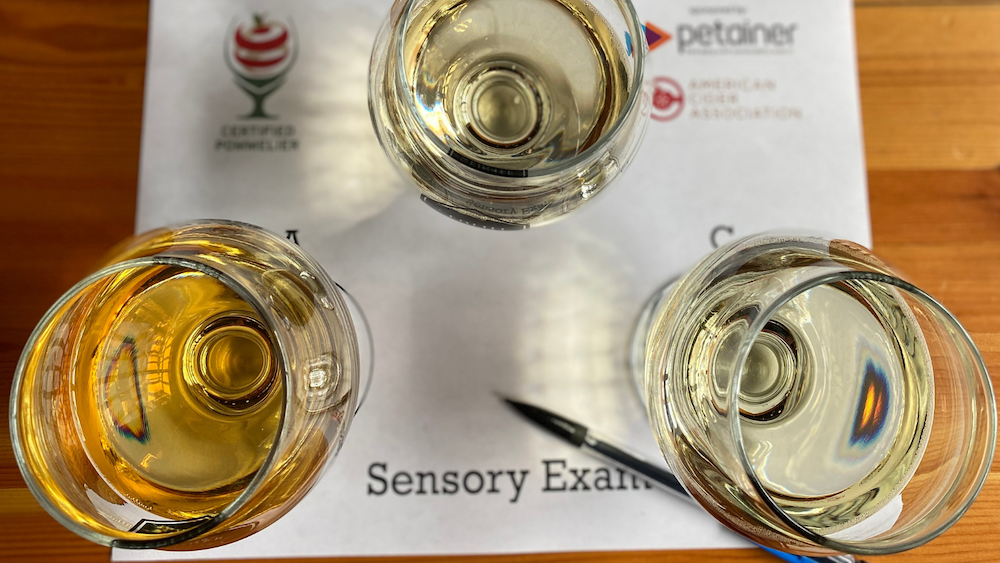
The American Cider Association announced on September 15, 2022 that they awarded eight new beverage professionals with the esteemed title of Certified Pommelier™. The new cohort passed the required exam on August 18 at the Angry Orchard Innovation Cider House in Walden, New York. The new Certified Pommeliers™ are from New York, Virginia, North Carolina and Russia. From New York are Elissa Booth, Joe Gaynor, and Matt Wynkoop of Angry Orchard; Paige Flori of Boutique Wines, Spirits and Cider; Meredith Collins of the blog Along Came A Cider,; and currently residing in New York–cider enthusiast Marina Borsalina from Russia. From Virginia is Joshua Corl of Back Bay’s Farmhouse Brewery, and from North Carolina is cider enthusiast Adam Snyder.
Cider is a beautifully nuanced beverage with a diverse set of elements that are often misunderstood by food and beverage professionals. Certifications are increasingly used in the professional realm to set oneself apart as an individual with specialized knowledge, though cider is often covered in a cursory manner by most certification programs, if at all.
“At the center of what we do at Angry Orchard is innovation, and education is at its core. We were thrilled to host a Certified Pommelier™ exam on the East coast and give more industry members the opportunity to advance their education,” says Will Loughlin, Certified Pommelier™ and Assistant Cidermaker at the Angry Orchard Innovation Cider House. “We see the Pommelier certification as an excellent tool to highlight exceptional individuals, as well as the cider industry as a whole. We’re thrilled to see interest in the exam growing and gaining more standing alongside wine and beer programs.”
The American Cider Association established its Certified Cider Professional (CCP) program in 2016 to educate those on the front-line of cider sales. The program began with a Level 1 certification to help those in the industry develop a fundamental understanding of cider. Recently, the ACA was pleased to celebrate 2000 Certified Cider Professionals.
The Certified Pommelier™ certification was developed to move beyond a fundamental understanding and to encourage cider professionals to think critically while demonstrating a higher understanding of the elements of cider. The rigorous test consists of five types of questions: short answer, fill in the blank, matching, essay and blind sensory (based on tasting).
“The Certified Pommelier™ exam is designed to be challenging, ” says Michelle McGrath, Executive Director of the ACA. “However, accessibility remains important. We’re rolling out more and more study aids in 2022, with a book on the horizon.”
The next Certified Pommelier™ exam is planned for February 1, 2023 at CiderCon® 2023 in Chicago, Illinois. You can learn more and register for the exam at CiderCon® 2023 on the ACA website.
The ACA asks that you contact Cider Education Outreach Manager Jennie Dorsey if you have questions about the program or are interested in taking either the Level 1 Certified Cider Professional test or the Certified Pommelier™ exam. You can also learn more at https://ciderassociation.org/certification.
###
New On Premise Data Reports from CGA

CGA has taken a deeper look at consumers’ recent behavior when it comes to On Premise beverage purchases. They shared these highlights of their recent research:
- On Premise visitation remains relatively static
- 33% are spending more per visit to a bar or restaurant vs. 18% spending less than they were three months ago – price increases have driven the increased spend
- Two in five expect to have to cut back on their future On Premise visits due to cost of living increases
It’s clear that inflation and lingering impacts of the pandemic are having an effect, but the good news is that 9% of bar and restaurant consumers reported cider as their beverage of choice in the last 3 months. Learn more with these reports from our partners at CGA.
ACA Celebrates 2000 Certified Cider Professionals
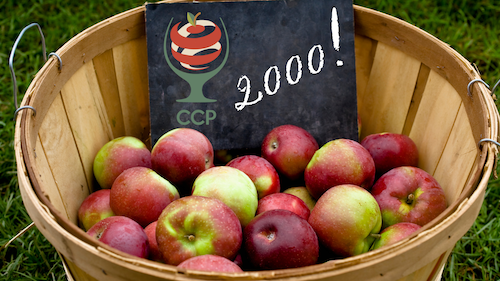
Cider can be a misunderstood beverage and with its increasing popularity in the United States the American Cider Association felt it was vital to create an education based program that would help those who work on the front line of cider sales speak in a knowledgeable manner about the ciders they’re selling, serving, and supporting. Thus, in 2016 the American Cider Association founded the Certified Cider Professional program (CCP) to educate those in retail and trade about cider. The success of the program is in the numbers. In just six years, 2000 people have become Certified Cider Professionals.
“We couldn’t be more delighted that 2000 have chosen to become Certified Cider Professionals,” says ACA Executive Director Michelle McGrath, “Reaching tastemakers and influencers is part of our broader strategy to increase cider sales and we look forward to watching the ranks of Certified Cider Professionals continue to grow.”
The ACA has continued to improve the CCP program since its inception and now offers a bundle package for those interested in becoming Certified Cider Professionals. The bundle includes a full study guide, an on-demand webinar, and access to the online 60 question exam. There are bulk discounts available for those wishing to get their staff certified and discounted pricing available to ACA members.
In addition, the ACA has developed a second tier Certified Pommelier™ designation. Certified Pommeliers™ must have a fundamental understanding of all topics covered in CCP Level 1, but must also be able to think critically and use the basics to demonstrate a higher understanding of the elements of cider. In order to become a Certified Pommelier™ candidates must sit for an in person exam that consists of five types of questions: short answer, fill in the blank, matching, essay and blind sensory (based on tasting). So far, 38 people have passed the rigorous exam and you can get to know them on the Certified Pommelier™ page.
To learn more about the Certified Cider Professional program you can head to the Certification page of the ACA website. For more information about the program, bulk discounts, and member discounts contact Cider Education Outreach Manager Jennie Dorsey.
CiderCon® 2022 Select Synced Audio Presentations Available to Members
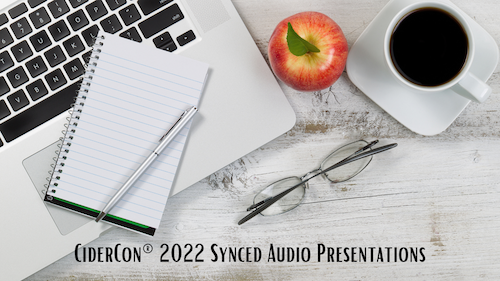
The American Cider Association is please to share that we have six synced audio presentations from CiderCon® 2022 held in February in Richmond, Virginia to share with members. If you missed the presentations or were unable to attend CiderCon® this year, now is your chance to do a little catch-up.
These synced presentations can be found in our Membership Portal, as well as presentation notes from many of the sessions held at CiderCon® 2022. You must be a member to access this information and you will be prompted to login to view the presentations.
Next Certified Pommelier™ Exam Will Be At CiderCon® 2023
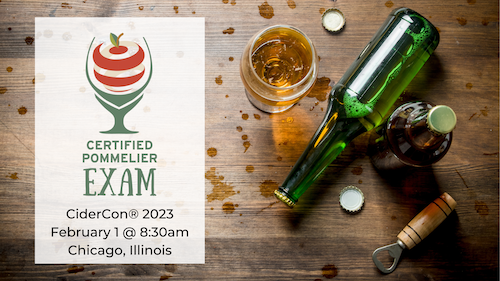
TAKE THE CERTIFIED POMMELIER™ EXAM AT CIDERCON® 2023!
Are you ready to take the next step in your professional development in the cider industry? Already passed the Certified Cider Professional Level 1 Certification and looking for that next challenge? Now’s your chance! The American Cider Association is pleased to announce that the next Certified Pommelier™ Exam will be at CiderCon® 2023 in Chicago, Illinois! The exam will take place February 1, 2023 starting at 8:30am at CiderCon® 2023. Read on to learn more about the Certified Pommelier™ Exam and how to prepare, what to expect, and how to register! (P.S. There’s a discount code available for ACA members who want to take the test. You can find that code HERE by logging in to your account.)
WHAT IS THE CERTIFIED POMMELIER™ EXAM?
American Cider Association’s mission is to grow a diverse and successful U.S. cider industry by providing valuable information, resources and services to our members and by advocating on their behalf. One way to fulfill this mission is through the Certified Cider Professional Program–a program aimed at educating the front-line of cider sales (distributors, retailers, bartenders and more!).
The intro-level certification (CCP Level 1) is an online test that can be taken at any time. The more advanced level of certification–the Certified Pommelier™ exam–is a sit-down hand-written exam: part short answer, part essay questions, and part sensory and taste evaluation questions. *CCP Level 1 is a prerequisite for Certified Pommelier.
Certified Pommeliers™ must have a fundamental understanding of all topics covered in CCP Level 1, but must also be able to think critically and use the basics to demonstrate a higher understanding of the elements of cider. The exam consists of five types of questions: short answer, fill in the blank, matching, essay and blind sensory (based on tasting).
The test is meant to be challenging. Studying is highly recommended.
The topics covered in the exam are:
- Apples, the Orchard & History
- Cider Making
- Flavor & Evaluation
- Cider Families
- Keeping & Serving
- Food & Cider
- Social Responsibility
*If a test-taker passes only the written or only the tasting portion of the exam, they are permitted the opportunity to retake the un-passed portion of the exam at a future date (within 18 months).
WHY BECOME A CERTIFIED POMMELIER™?
Cider is a beautifully nuanced beverage with a diverse set of elements that are often misunderstood by food and beverage professionals. Certifications are increasingly used in the professional realm to set oneself apart as an individual with specialized knowledge, though cider is often covered in a cursory manner by most certification programs, if at all. Although there are already more than 1,700 Level 1 Certified Cider Professionals, being recognized as a Certified Pommelier™ will put you in the vanguard of verified advanced cider specialists in this ever growing category.
HOW MUCH DOES THE TEST COST?
For ACA members, the exam is $200 per attempt. There is a discount code that members can access to receive the exam at the membership rate of $200. That discount code can be found here. For non-members, the exam is $275. Should it be needed, test takers can retake future written or tasting portions of the exam at a separate sitting with a 25% discount. Price now includes access to a pre-recorded introductory webinar to the updated sensory form and sample sensory forms from key cider regions. The webinar can be accessed at any point to prepare for your exam.
FAQs
- Are there ID or minimum age requirements to enter the event? YES- You must be 21 or older and you must provide an ID to prove you are who you say you are.
- Do I need to pass the level 1 CCP exam to take the Certified Pommelier™ test? Yes. Passing the Level 1 CCP exam is a prerequisite. If you have not yet taken the Level 1 exam, you can purchase the Level 1 bundle on demand HERE. The bundle includes an on-demand webinar, study guide, and access to the online exam.
- What can I bring into the event? Nothing may be brought into the exam room. Cell phones must be left at the door. Pencils and drinking water will be provided.
- How can I contact the organizer with any questions? Please contact CCP contributor and proctor Jennie Dorsey at jennie@ciderassociation.org.
- What’s the refund policy? We will refund test takers up two weeks before the exam.
- Is there a training workshop? This is not a workshop, but an exam only. Once you register for your exam, study materials including webinars and study guides will be emailed to you. There is also a dedicated Facebook Group (that is open for all to join) with prep materials and in depth peer conversations. STUDY! We highly recommend interviewing cidermakers and cider tenders to help prepare. Blind tasting flights are also good prep. In addition, two new upcoming sensory webinars will be released in fall of 2022 and available for purchase.
- Is it ok if the name on my ticket or registration doesn’t match the person who attends? If you are transferring registration to another person, please email us in advance.
- Is there a tasting section on the test? Yes. You will be asked to evaluate ciders from multiple cider families.
- How long does the test take? You are given 2 hours to complete the theory portion of the exam and 1 hour and 30 minutes to complete the sensory portion. There will be a 15 minute break in between exam portions.
Refund and Opt Out Policy
Refunds will be offered up to 2 weeks before the exam.
Any purchaser can opt out of the exam up to 72 hours prior to scheduled time. If opt out is chosen, another exam date must be chosen within 18 months. No refunds will be given.



